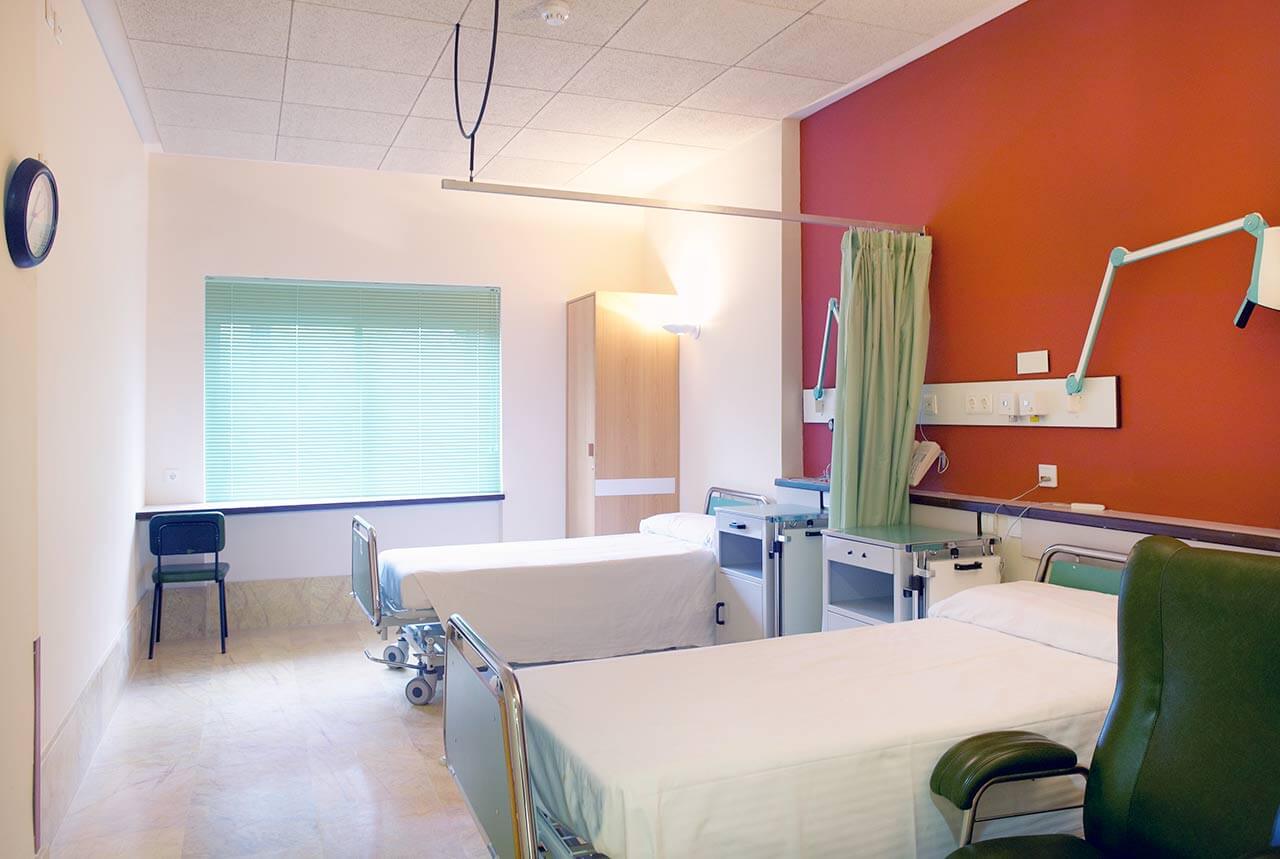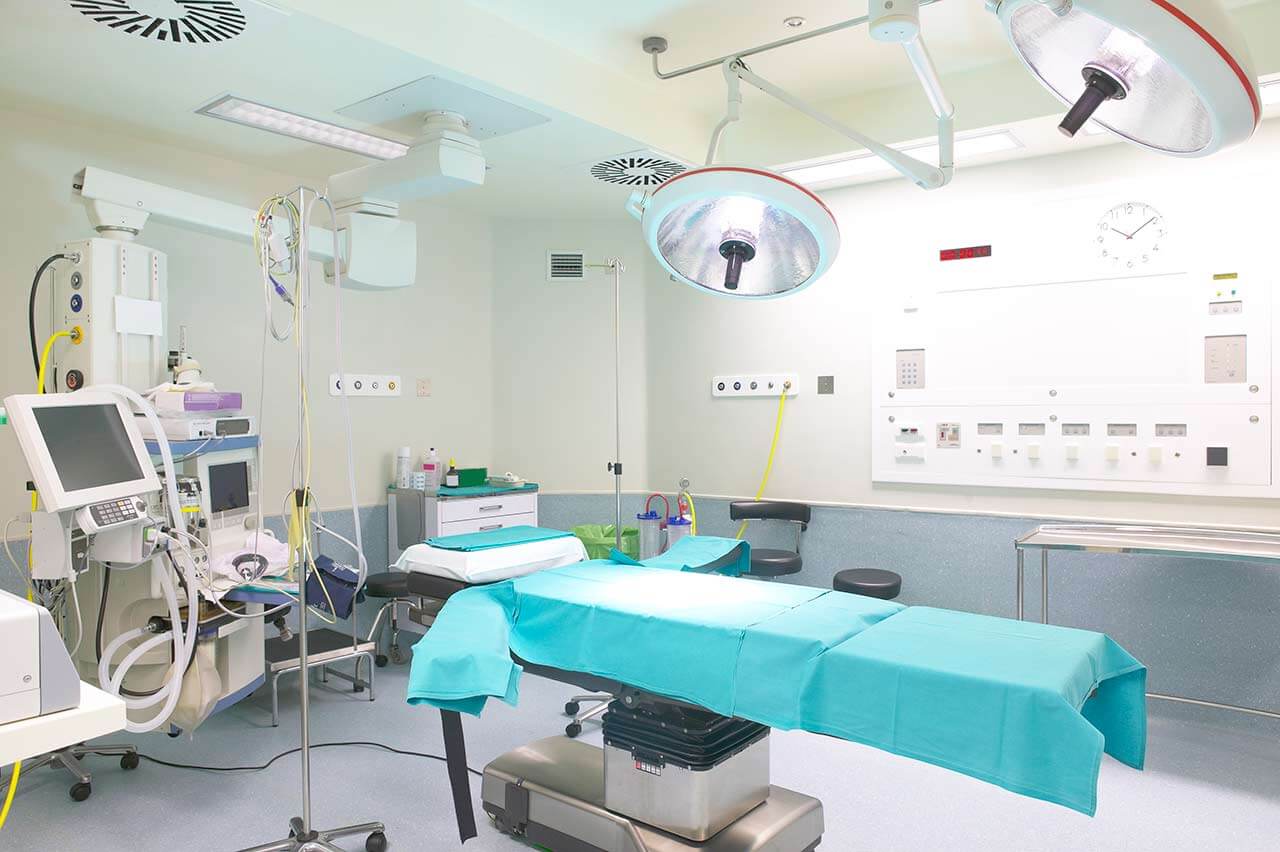
The program includes:
- Initial presentation in the clinic
- clinical history taking
- physical examination
- neurological examination
- laboratory tests:
- complete blood count
- general urine analysis
- biochemical analysis of blood
- TSH-basal, fT3, fT4
- tumor markers
- indicators blood coagulation
- CT/MRI of head
- chemotherapy
- radiotherapy full course
- control MRI scan
- cost of essential medicines and materials
- nursing services
- services of all leading experts
- explanation of individual treatment plan
Required documents
- Medical records
- MRI/CT scan (not older than 3 months)
- Biopsy results (if available)
Service
You may also book:
 BookingHealth Price from:
BookingHealth Price from:
About the department
The Department of Radiation Therapy at the Hospital Cologne-Merheim carries out all types of modern radiation therapy at the highest technological level, strictly adhering to radiation protection standards. The department has two powerful Elekta Synergy linear accelerators and a GammaMed plus IX BrachyVision device for radiation therapy using the afterloading technique. An irradiation scheme is planned on a Toshiba Aquilion Large Bore CT scanner with a 90 cm gentry aperture. Combined chemoradiation therapy is also performed here in collaboration with relevant specialists. In most cases, radiation therapy is provided on an outpatient basis without a mandatory hospital stay. The key focus is on radiation therapy for patients with breast cancer, colon cancer, lung cancer, brain cancer, prostate cancer, and head and neck tumors. The department's medical team also specializes in radiation therapy for patients with benign diseases. The health of patients is in the safe hands of a highly professional team of experienced doctors who develop a customized course of radiation therapy for each patient, provide detailed information about the peculiarities of the upcoming treatment and the expected results, and support patients during the therapeutic process. Close cooperation between the department's radiation therapists and surgeons, oncologists, and doctors from other related disciplines plays a crucial role in treatment success. The department is headed by Dr. med. Michaela Hammer-Hellmig.
The department offers all modern radiation therapies, including image-guided radiation therapy (IGRT), volumetric modulated arc therapy (VMAT), intensity-modulated radiation therapy, brachytherapy, and stereotaxy. The medical facility also performs respiratory-gated radiation therapy, for example, in cases of left-sided breast cancer. The wide variety of radiation therapy methods makes it possible to combine different types of irradiation and achieve optimal results.
Image-guided radiation therapy (IGRT) is an innovative and highly effective method of irradiating malignant tumors. It allows the doctors to destroy more cancer cells with minor effects on healthy adjacent tissues. Prior to IGRT, the patient undergoes computed tomography (CT) scanning, based on the results of which radiation therapists create a 3D model of the tumor using a computer program and determine the optimal radiation dose and the beam trajectory. Image-guided radiation therapy is thus a highly precise method of radiation therapy that practically does not cause any side effects.
The department also conducts volumetric modulated arc therapy (VMAT). This technique is an improved version of IGRT radiation therapy. This involves the continuous delivery of individually calculated radiation doses during a 360-degree rotation of the linear accelerator gantry. The main difference between volumetric modulated arc therapy and image-guided radiation therapy is that, due to the rapid rotation of the gantry, radiation is delivered at any angle, and the duration of a radiation therapy session lasts only a few minutes. VMAT and IMRT radiation therapies are performed for almost all types of cancer.
The doctors at the medical facility regularly perform brachytherapy, which is internal radiation therapy. During such treatment, the radiation source (as a rule, a tiny capsule with radioisotopes) is placed in close proximity to the malignant tumor or inside the neoplasm. As a result, a high dose of radiation is delivered to the oncological focus without harming adjacent healthy tissues. A minimally invasive intervention is required to place the radiation source in the target area. Brachytherapy is indicated for patients with uterine cancer, cervical cancer, vaginal cancer, prostate cancer, esophageal cancer, rectal cancer, etc.
The department has also accumulated impressive experience in stereotactic radiation therapy. This high-tech method allows doctors to destroy malignant cells through a single application of a high dose of radiation. Stereotactic radiation therapy is indicated for patients with hard-to-reach brain tumors when surgery is contraindicated. Prior to the procedure, the patient lies on a linear accelerator table and wears a special frame on their head, which securely immobilizes it in the required position because complete immobilization of the irradiated area is required for the effectiveness and safety of treatment. The next step of the procedure involves directing high-energy ionizing radiation onto the neoplasm from different angles, which is focused in the center of the tumor and destroys malignant cells.
The department's range of medical services includes:
- Image-guided radiation therapy (IGRT)
- Volumetric modulated arc therapy (VMAT)
- Brachytherapy (internal radiation therapy) with a focus on high-dose irradiation
- Radiation therapy using the Afterloading technique
- Stereotactic radiation therapy
- Chemoradiation therapy (in collaboration with oncologists)
- Other types of radiation therapy
Photo of the doctor: (c) Kliniken der Stadt Köln gGmbH
About hospital
According to the reputable Focus magazine, the Hospital Cologne-Merheim ranks among the top German medical centers!
The health facility is an academic hospital of Witten/Herdecke University, which gives patients access to the very latest developments in European medicine. The Hospital Cologne-Merheim positions itself as a maximum care medical center, which is why it offers a wide range of high-quality medical services. The hospital has 752 beds in 13 specialized departments. More than 28,000 inpatients are treated here every year. Outpatient care is also provided for many medical specialties. The hospital also collaborates closely with the University Hospital Cologne, carrying out fruitful work at the Transplant Center.
The most successful areas of clinical practice in the medical center are neurosurgery, pulmonology, transplantology, surgery (in particular, minimally invasive), cardiology, traumatology, joint replacement surgery, and plastic surgery. The Departments of Ophthalmology, Anesthesiology, Radiology, Neuroradiology, and Palliative Care are also distinguished by top-class medical service. In addition, the Departments of Neurology and Neurosurgery provide effective early rehabilitation programs for patients with stroke, traumatic brain injuries, brain tumors, and other neurological diseases. Comprehensive treatment of such a level is available only at highly specialized and best medical facilities in Germany.
The hospital has several ultramodern intensive care units, where patients in critical condition are treated.
It is worth noting that the hospital was the first in the region to be certified in accordance with KTQ® (Cooperation for Transparency and Quality in Health Care). The certification process is repeated every three years, and each time the hospital passes it with excellent results.
The basis for high-quality medical services lies in state-of-the-art equipment, the application of effective and reliable therapeutic methods, and the vast clinical experience and professionalism of doctors and nursing staff. The main value for each employee at the hospital is the patient's health. Doctors devote enough time to personal communication with patients in order to establish a trusting relationship and explain the details of upcoming treatment.
Photo: (с) depositphotos
Accommodation in hospital
Patients rooms
The patients of the Hospital Cologne-Merheim live in single and double rooms. All patient rooms are cozy and designed in light colors. Each patient room has an ensuite bathroom with a shower and a toilet. The furnishings of a standard patient room include an automatically adjustable bed, a bedside table with a pull-out tray, a wardrobe for personal belongings, a table and chairs for receiving visitors, a TV, and a telephone. Wi-Fi is also available in the patient rooms.
If desired, patients may stay in an enhanced-comfort room, which additionally provides a safe, a mini-fridge, and upholstered furniture.
Meals and Menus
The patients are offered three tasty and healthy meals a day: breakfast, lunch, and dinner. Breakfast and dinner are served as buffets, and for lunch, there is a set of three menus to choose from.
If, for some reason, you do not eat all the foods, you will be offered an individual menu. Please inform the medical staff about your dietary preferences prior to treatment.
Further details
Standard rooms include:
Religion
There is a chapel on the territory of the hospital, where Catholic and Evangelical worship is regularly held on Sundays and religious holidays. The chapel is also open daily for visits and solitude for prayers.
The services of representatives of other religions are available upon request.
Accompanying person
Your accompanying person may stay with you in your patient room or at the hotel of your choice during the inpatient program.
Hotel
You may stay at the hotel of your choice during the outpatient program. Our managers will support you for selecting the best option.




